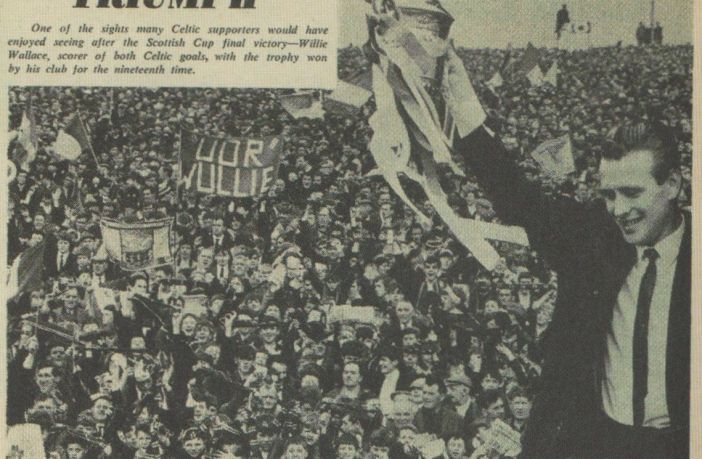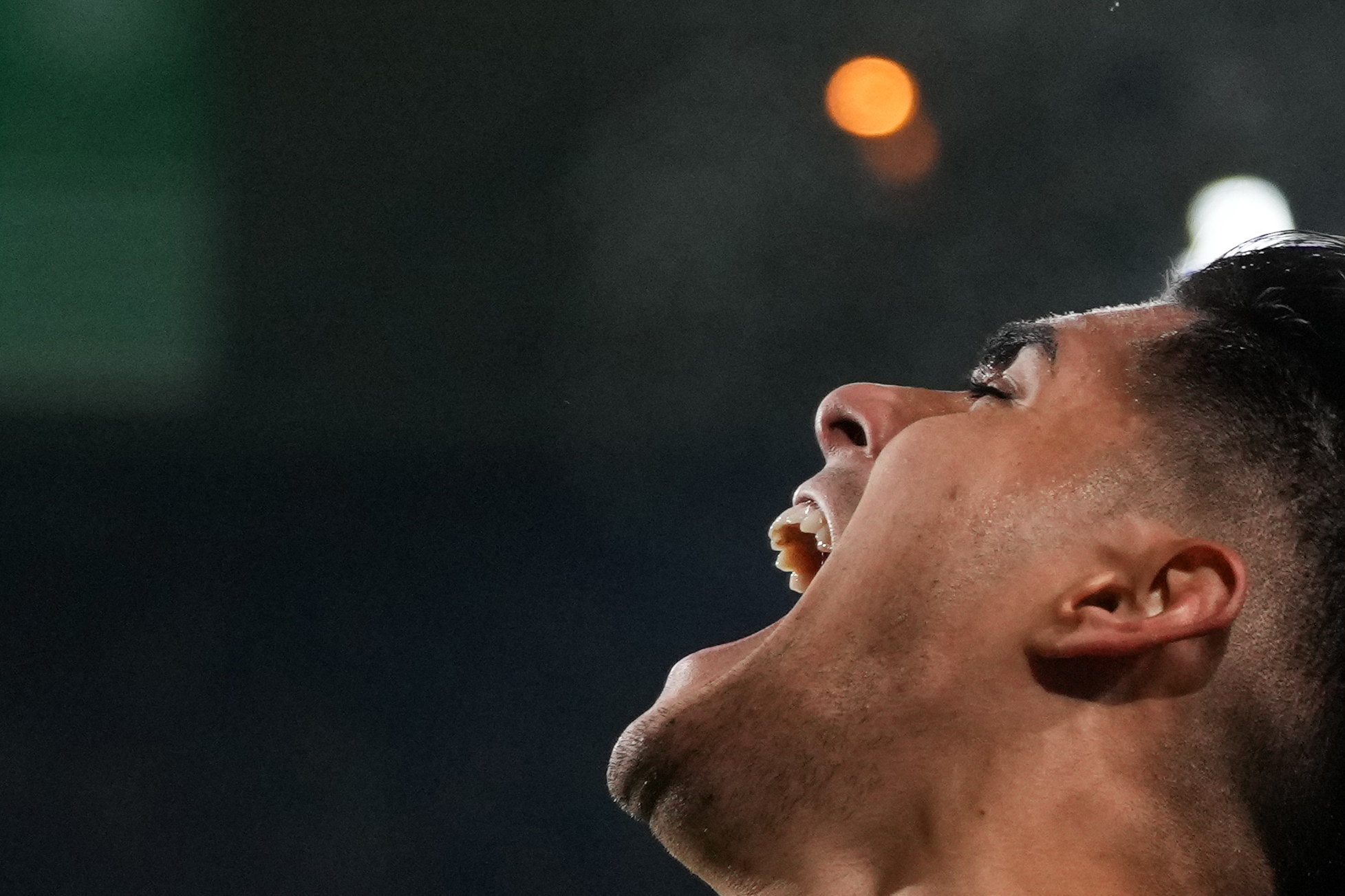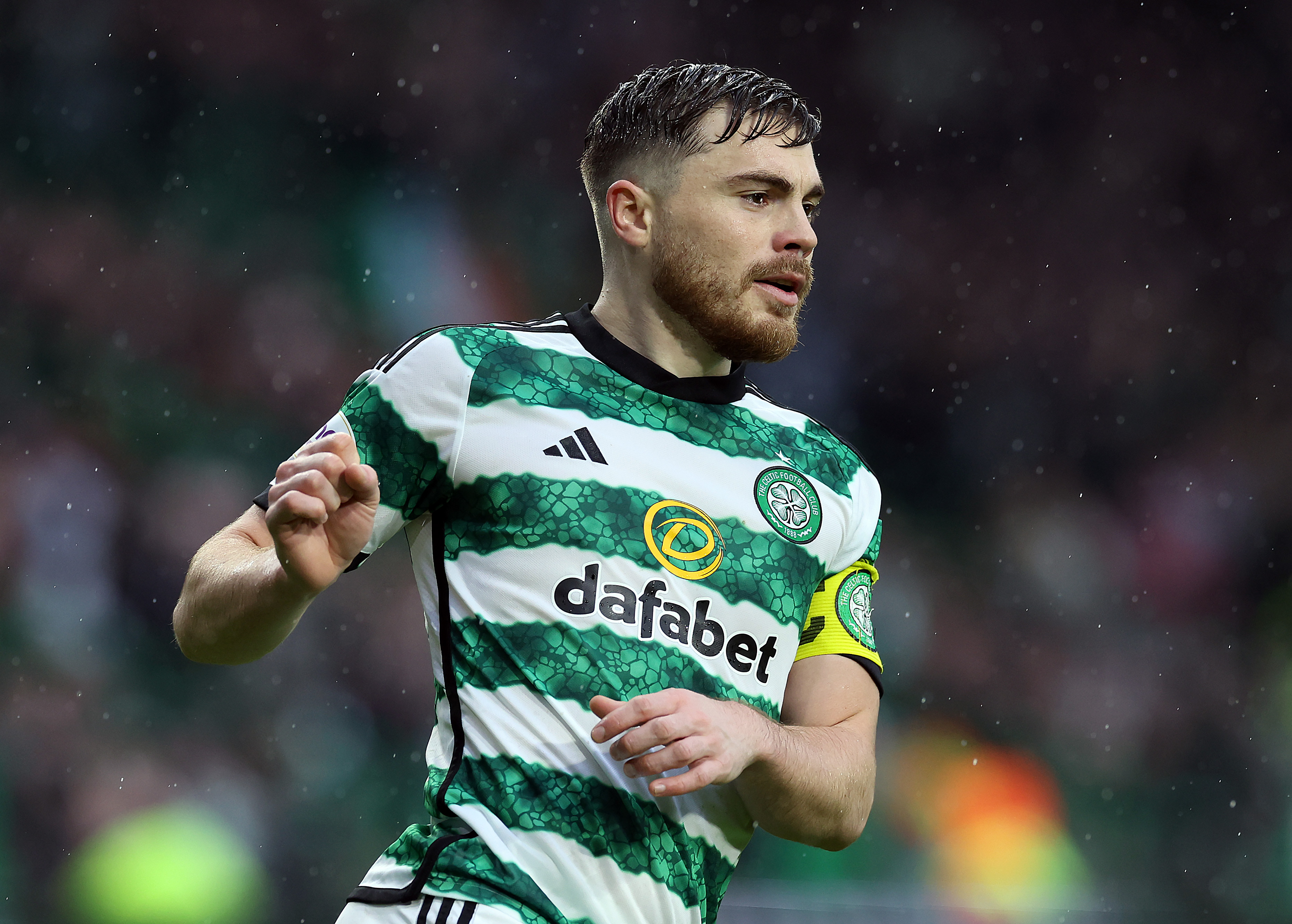Willie Wallace…Lisbon Lion and so much more (Part 4)…
August 1967 marked the beginning of Willie Wallace’s first full season in the hoops of Celtic. The striker marked it appropriately on the evening of Tuesday 22nd with his first hat-trick for the club, debutant Pat McMahon from Willie’s old stomping ground in Kilsyth notching the other two goals as Celts beat Partick Thistle 5-0 in the first round of the Glasgow Cup.
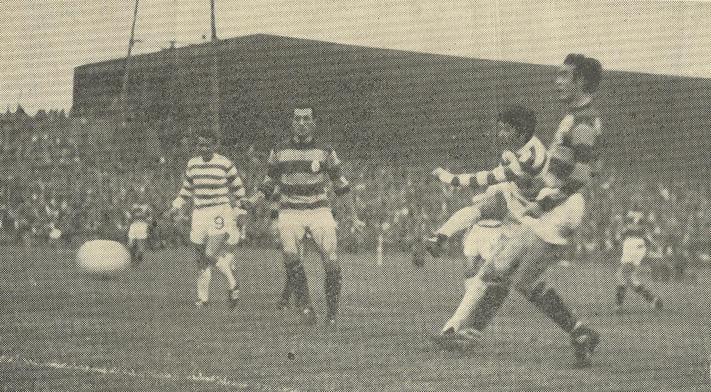
Full-back Chris Shevlane had also made his first appearance for the Bhoys that evening, having been a teammate of Wallace’s at Tynecastle for several years before that. Shevlane would eventually move back to Edinburgh to sign for Hearts big rivals, joining Hibernian in May 1968.
Another extremely tough League Cup section saw Celts in with Rangers, beaten Cup-finalists Aberdeen and Dundee United, who had inflicted two of the team’s only three defeats in the whole of the previous season, the 1-0 loss in Novi Sad making up that set.
The Tannadice side would be dispatched home and away by that same 1-0 scoreline this time around, with a draw at Ibrox the only point dropped in the six fixtures. The key moment in the qualifying phase came at Celtic Park on Wednesday, 30 August 1967. Rangers were leading by an early Willie Henderson strike with 15 minutes remaining, when the same player went down following a challenge from John Clark.
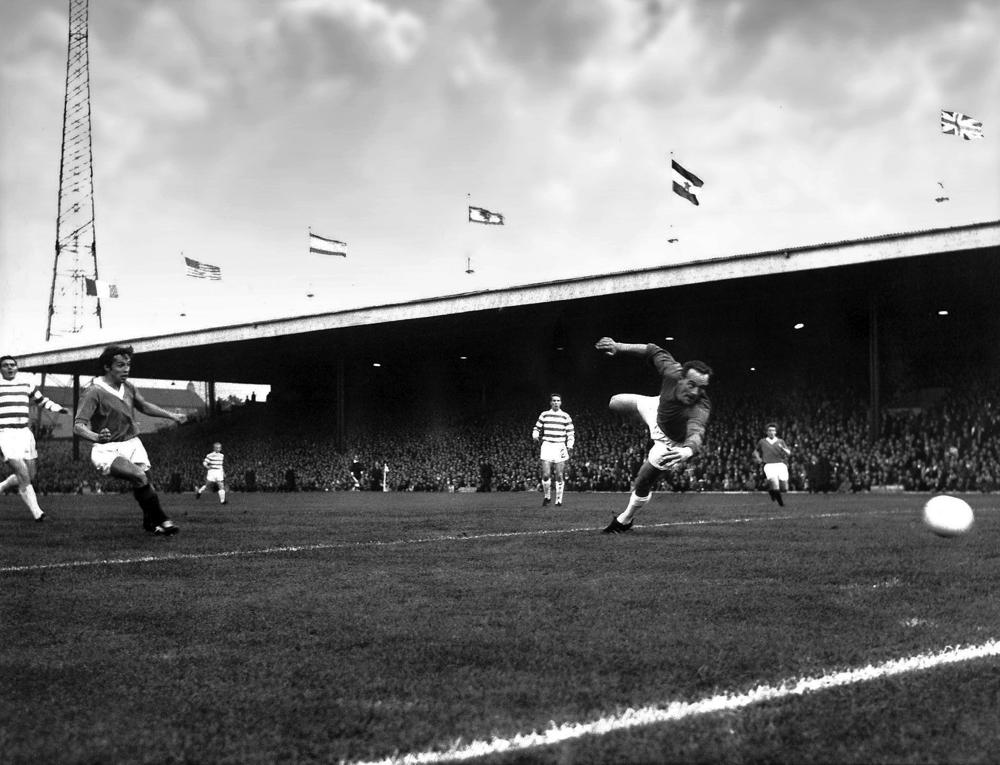
Referee Tom ‘Tiny’ Wharton pointed to the spot and up stepped Kai Johansen to win the match and the group for the Ibrox side. Rangers’ Danish full-back had scored the late winner which had won the Scottish Cup Final replay the previous spring, his shot flashing past Ronnie Simpson after a goalless draw on the Saturday, however, this would not be his night.
His spot-kick rebounded from Simpson’s crossbar back to him, and as 75,000 supporters collectively held their breath, instinctively the Dane played the ball a second time, so giving away an indirect free-kick. Celtic raced up the pitch and Willie Wallace compounded Johansen’s error by equalising for the Bhoys. The Hoops then stepped up another gear to add further goals from Bobby Murdoch and Bobby Lennox, to win 3-1 and thus take the section.
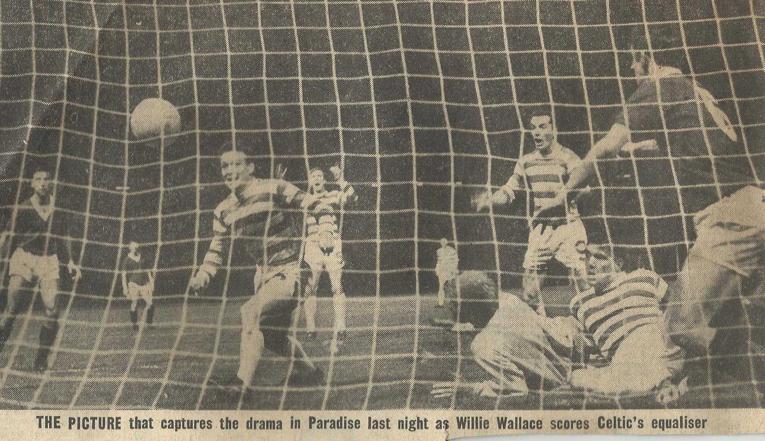
September would contain both highs and lows for Celtic, Willie netting a double against South American outfit Penarol at Celtic Park on the first Tuesday, to give the Hoops a 2-0 win in front of 56,000 spectators. The Uruguayans had won the Copa Libertadores, then succeeded Inter Milan as World Club Champions in 1966, beating their European equivalents, Real Madrid, in both legs by the same 2-0 scoreline. Just the week before the game in Glasgow, their South American crown had passed to Argentina’s Racing Club de Avellaneda, following a play-off victory over Penarol’s main rivals Nacional in Santiago. Both Penarol and Nacional were based in the capital city, Montevideo. Celts would face Racing Club imminently and Montevideo would, unfortunately, become very relevant. More, or perhaps less, on that to follow shortly.
On Wednesday, 20 September 1967, Celtic’s defence of their own European title commenced with the visit of Russian champions Dynamo Kiev to Glasgow. Celts had eliminated Kiev from the European Cup-Winners’ Cup the previous January – you may recall the infamous midnight Friday training session ahead of the following day’s clash with Willie Wallace’s Hearts at Tynecastle – and were favourites to do so again. The omens were good, Jock naming the Lions for the seventh time and the referee being Kurt Tschenscher of West Germany, as in Lisbon.
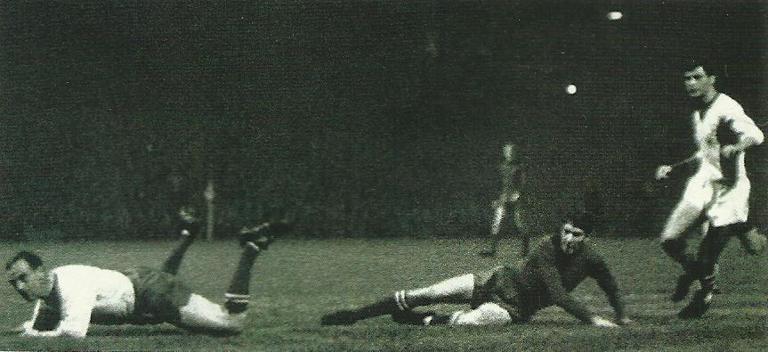
It would be clear early on that tonight would be different gravy, goalscoring hero Tommy Gemmell stumbling to allow Pusach to stun the champions within four minutes, that lead doubled by the half-hour by Bychevetz, following a rare mistake by captain Billy McNeill. Bobby Lennox would restore some hope of an unlikely Hoops comeback, by pulling a goal back on the hour, however, the Russians would eventually hold out to inflict a first-ever home defeat in European competition for Celtic. This was most definitely not in the script.
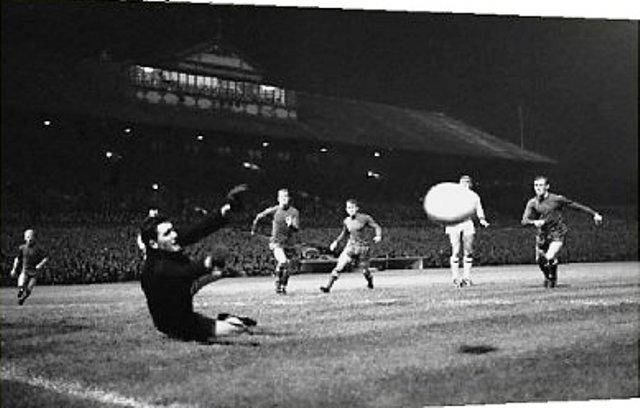
The return leg will mainly be remembered for a catalogue of controversial decisions from the Italian referee, Antonio Sbardella. On the hour, he took great umbrage at Bobby Murdoch’s reaction to the award of an innocuous free-kick against him, issuing the midfielder with a second caution before ordering him from the field.

Despite that setback, Lennox again came to Celtic’s rescue, netting at the far post from a near-impossible angle within minutes of Murdoch’s dismissal. And when John Hughes appeared to score a vital second away goal soon afterwards, after a howler from Russian keeper Bannikov, all Celts efforts looked to have paid off.
Incredibly, Sbardella blew up for a non-existent infringement. In the dying seconds, that man Bychevetz again found the target, the cup-holders sent tumbling out at the first hurdle.
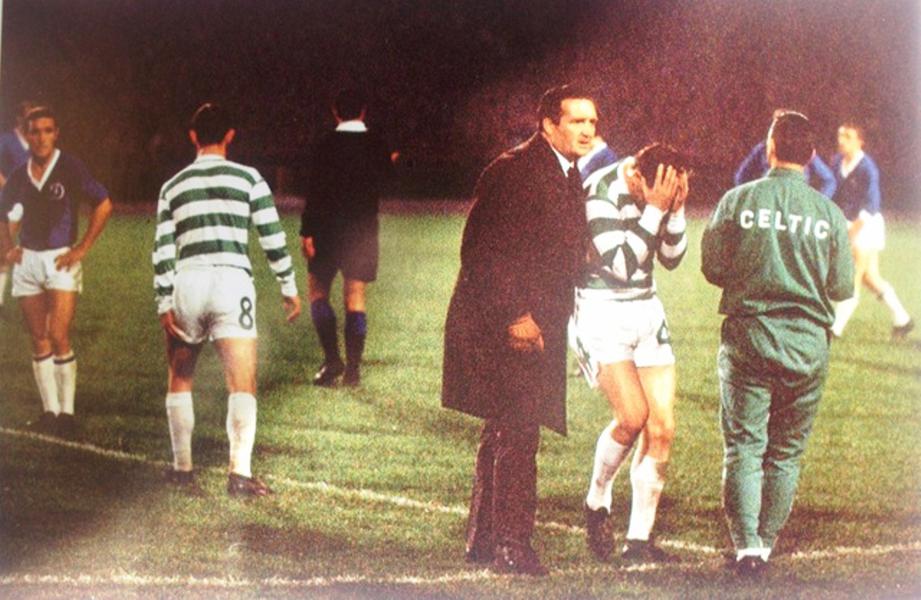
On Wednesday, 18 October 1967, the now-deposed champions of Europe began their quest for a world club title by facing Racing Club before 91,000 spectators at Hampden, the venue changed from Celtic Park to allow the huge crowd entry. In a tousy, bad-tempered match, Billy McNeill would grab the only goal with a towering header with 20 minutes remaining.
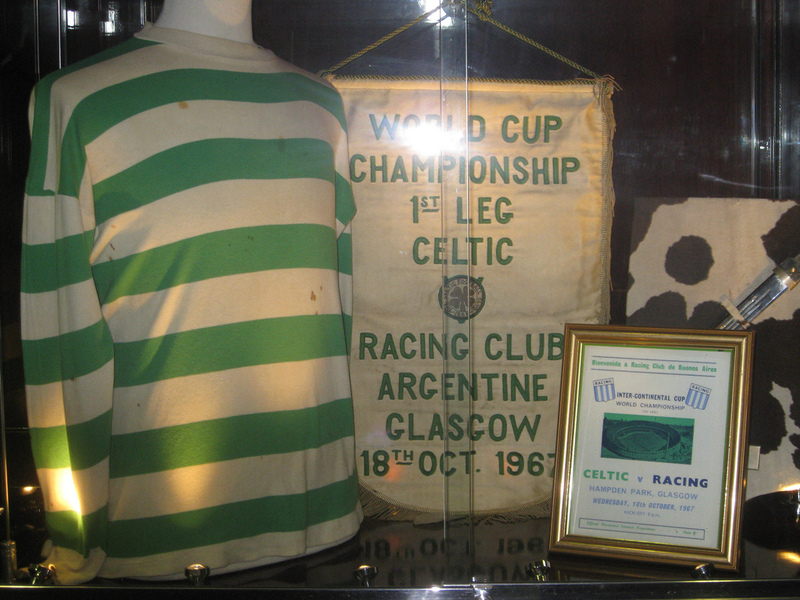
The next day, Willie Wallace travelled with the Scotland party for the European Championship qualifier in Belfast. The annual Home International tournaments of 1966/67 and 1967/68 had been ‘doubled up’ to serve as a qualification group for the finals to be held in Italy in the summer of 1968. The wonderful 3-2 win secured at Wembley in April 1967 had put Scotland in pole position to win the section, with both Wales and England still to come to Hampden.
There were 55,000 noisy spectators packed into Windsor Park on the afternoon of Saturday, 21 October 1967, to watch the following Scotland side take the field for Willie’s sixth full cap.
Ronnie Simpson (Celtic)
Tommy Gemmell (Celtic)
Eddie McCreadie (Chelsea)
John Greig (Rangers)
Ron McKinnon (Rangers)
Ian Ure (Arsenal)
Willie Wallace (Celtic)
Bobby Murdoch (Celtic)
Jim McCalliog (Sheffield Wednesday)
Denis Law (Manchester United)
Willie Morgan (Burnley)
Although Ronnie Simpson would receive some plaudits for saving a Johnny Crossan penalty, that afternoon would belong to George Best, the Irish superstar very much in the mood and running through the Scottish defence at will. The only surprise on the day was that it was Dave Clements of Coventry City who scored the winner rather than George, his drilled finish with 20 minutes remaining the only goal of the game, as the Scots slumped to a costly defeat.
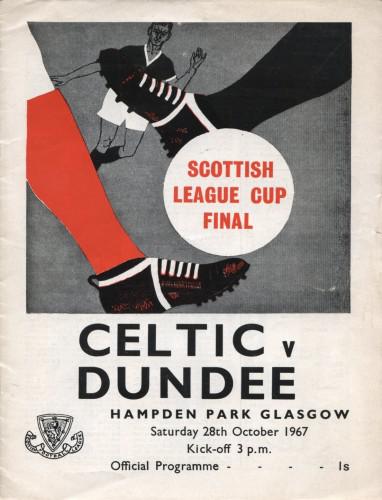
Seven days later, the Celtic contingent were back on the Hampden trail for the season’s first domestic showpiece, Dundee the opposition for the Scottish League Cup final.
John Hughes would replace the suspended Jimmy Johnstone in the only change to the Lisbon line-up, Yogi adding to Steve Chalmers’ early goal to put Celts 2-0 up within 10 minutes in front of 67,000. Former Rangers striker George McLean, an Ibrox casualty from the shock Scottish Cup defeat at Berwick Rangers earlier that year, pulled a goal back for Dundee midway through the first half, the score then remaining at 2-1 until a goal rush in the final 17 minutes of the match.
Chalmers added his own second, before future Dundee United manager Jim McLean struck to make it 3-2 in the 77th minute, Bobby Lennox then immediately restoring Celtic’s two-goal advantage. The Hampden goal spree continued, as George McLean notched his own double for 4-3 before Willie Wallace had the final say, his late strike sealing a third successive League Cup win for Celtic and a second winner’s medal in the competition for his personal collection.
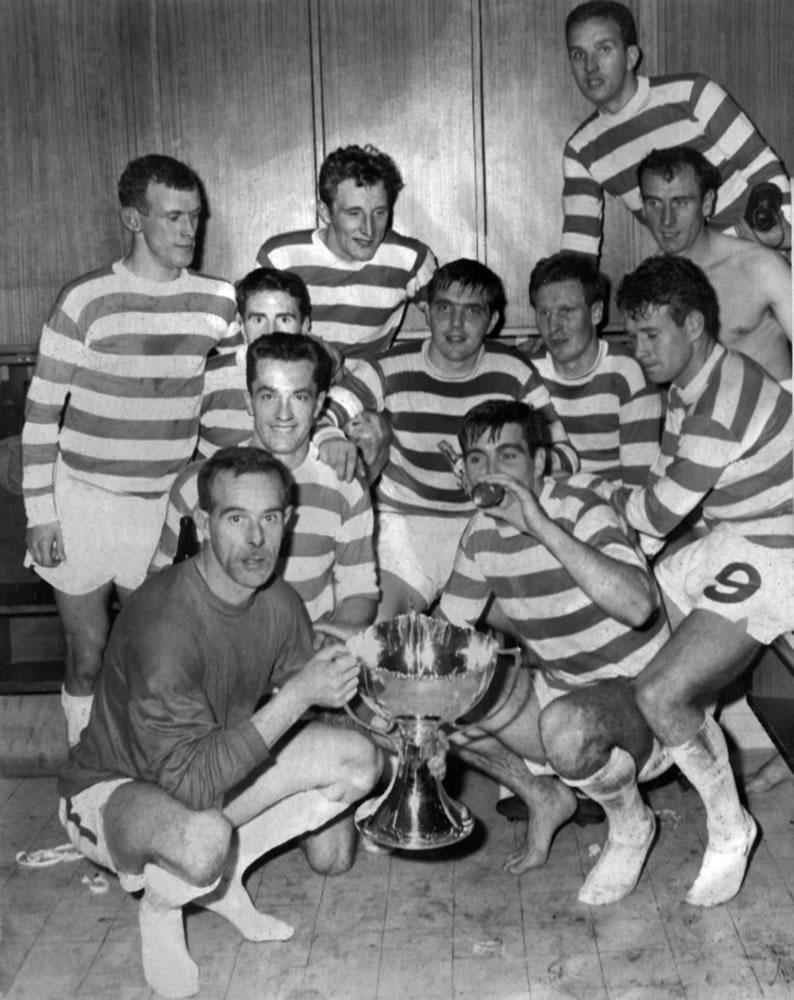
Celts would then immediately head out to South America for the ill-fated clashes with Racing Club, a real low point in our history. Having worked so hard to reach the pinnacle of world club football, it was a crying shame how events would pan out there. Ronnie Simpson would be felled by a missile BEFORE the second leg kicked off in Buenos Aires, on Wednesday, 1 November 1967, Celts losing 2-1 despite taking the lead through a Tommy Gemmell penalty midway through the first half, as the football became secondary to a series of shocking fouls.
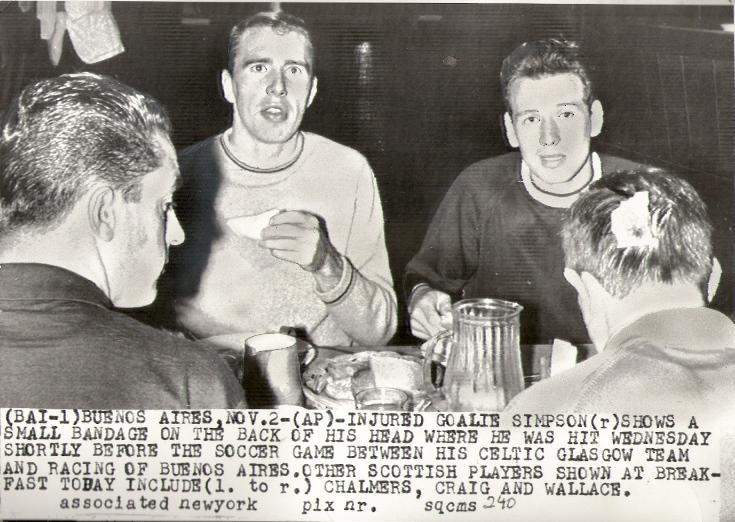
With no ‘away goals’ rule in force, it would then all kick-off in the play-off, three days later in neutral Montevideo, with a number of scores being settled throughout a torrid 90 minutes. The Paraguayan referee would send off four players from Celtic and two from Racing Club, although Bertie Auld refused to leave the pitch as, bizarrely, what play there was, continued. Ironically, the only goal of the match was an absolute screamer from Cardenas, which flew past John Fallon into the top corner of the net. Repercussions would be costly and prolonged.
Whilst Willie had remained on the field throughout all three Racing Club bouts, he was not so fortunate at Celtic Park on Saturday, 2 December 1967. Six minutes from time, he got involved in some ‘handbags’ with Dundee United’s Davie Wilson, the former Rangers winger sinking to the turf after Wallace had raised his hands towards him. To this day, Willie insists that he made no contact whatsoever with the player, albeit recalling with a wry smile that Jock Stein told him that he had deserved to go anyway, for making such a poor attempt at a punch!
January 1968 saw the Ghost of Scottish Cup past come back to haunt Celtic, as Dunfermline Athletic returned from Glasgow having knocked the holders out of the cup following a 2-0 victory, a degree of revenge for their defeat in the final three years earlier. The Pars would go on to lift the Scottish Cup in April, beating a Hearts side containing many of the players who had been recent colleagues of both Willie Wallace and the Fifers captain, Roy Barry. This would be the second such success for Athletic, having beaten Celtic in 1961 under Jock Stein.
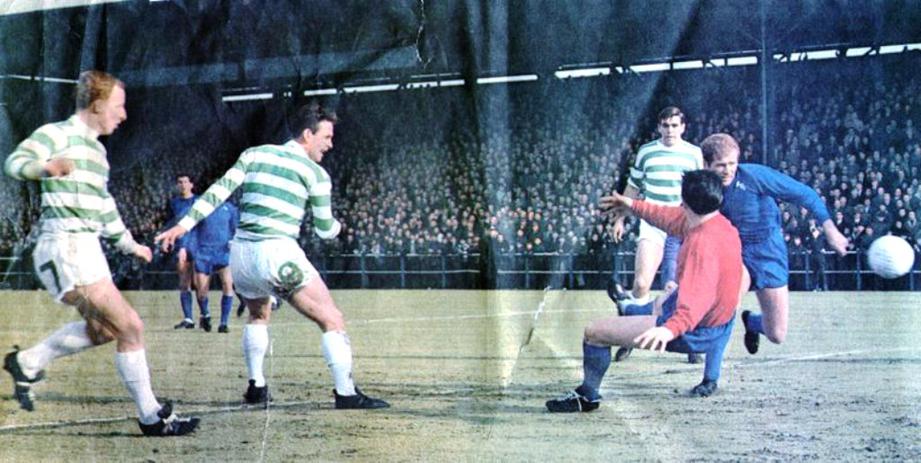
Saturday, 2 March 1968 was a red-letter day for two Celtic players. Captain Billy McNeill was celebrating his 28th birthday, whilst Willie Wallace would score four goals in the Hoops for the first time, as the Bhoys beat Kilmarnock 6-0 at Rugby Park, Bobby Lennox and substitute Jimmy Quinn adding the others. Almost exactly five years earlier, high-flying Killie had dished out that same punishment to a Celtic side giving a teenage Jimmy Johnstone his senior debut.
March would turn out to be an incredible month for Wallace, the striker grabbing 16 goals in that period. This included hat-tricks against Airdrieonians and Raith Rovers at Celtic Park plus a brace in the St Patrick’s weekend friendly with Shamrock Rovers at Dalymount Park, Dublin. That was the occasion when Jock Stein visited Eamonn de Valera with the European Cup.

Those goals would go a long way towards securing Celtic’s third successive championship, clinched the midweek after Dunfermline Athletic won the Scottish Cup with a 2-1 victory over the Pars, on Wednesday, 30 April 1968, in front of a record crowd of 27,000 at East End Park.
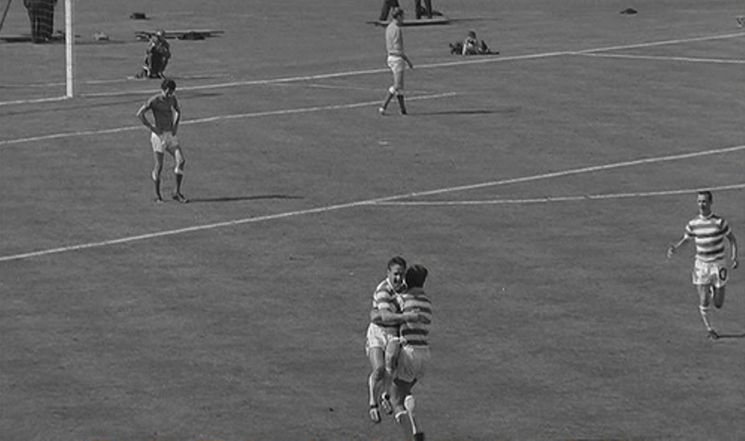
Willie started the 1968/69 campaign where he had left off, scoring for fun. I remember to this day sitting on an Ayrshire beach listening to the opening League Cup game from Ibrox coming through on the radio, and the thrill and the noise when Willie Wallace scored twice to win the match. Willie would then score all four goals as Partick Thistle were beaten 4-0 the following Saturday, then the winner in the return match with Rangers at Celtic Park, steadying himself after John Hughes had struck the crossbar, before coolly placing the ball past Norrie Martin.
Bobby Lennox would go one better in the final section match at Firhill, on Saturday, 31 August 1968, hitting five as Celts beat Partick Thistle by 6-1, to finish with a 100% record in the group. He would repeat that feat just 11 days later, as Hamilton Academical were demolished 10-0 in the first leg of the quarter-final, whilst, incredibly, his strike partner Stevie Chalmers scored the other five! I cannot think of another example where two players have scored five goals in the same game.
In the return leg at Douglas Park, two weeks later, and with Celtic 2-1 ahead at half-time, Jock Stein introduced 17-year-old Kenny Dalglish for his senior debut, in place of Charlie Gallagher. Kenny would later joke that Stein was clearly not a man for taking chances, waiting until the Hoops were 11 goals ahead before giving him his opportunity! As one Celtic career began, sadly another ended. Charlie Gallagher would not play for the Bhoys again.

That season would come down to a critical period in March and April 1969, Willie notching a hat-trick in the 7-1 mauling of Arbroath at Celtic Park on the first Wednesday in March, before a costly slip by Billy McNeill at the same venue, seven days later, allowed Pierino Prati to score the solitary goal of the European Cup quarter-final for AC Milan, ending hopes of a second success in that competition, Celts having earlier destroyed St Etienne and Red Star Belgrade.
The three domestic trophies were tied up within 21 days in April, commencing with a 6-2 mauling of Hibernian in the delayed League Cup final on Saturday 5th, a fire in the South Stand preventing the game taking place in its usual October slot. Bobby Lennox, having the season of his life, scored a hat-trick in that one, as Celts led 6-0 before easing off towards the end.
A last-minute equaliser from Tommy Gemmell then capped a superb fightback from two goals down at Rugby Park, on Monday, 21 April 1969, earning the Hoops the point required for a fourth successive League title. Five days later, a second treble in three years was secured with a wonderful 4-0 victory over Rangers in the Scottish Cup Final, in front of 133,000 spectators, the impressive Wallace collection thus boosted by another trio of domestic winner’s medals.
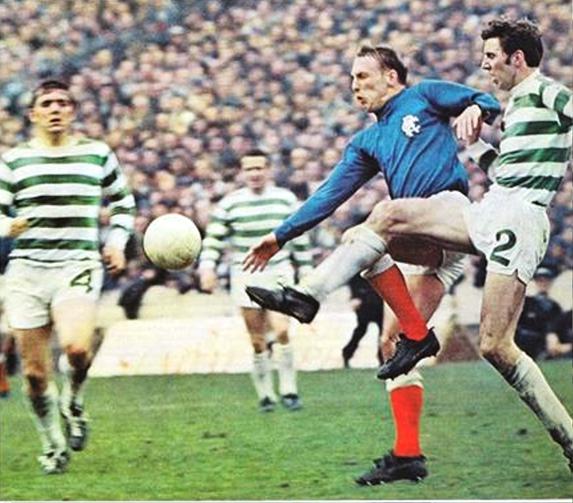
On the international front, there had been three further appearances for Willie in ‘68/69. On Wednesday, 4 September 1968, he had lined up for the Scottish League for the third time, for a match at Dalymount Park against a League of Ireland select.
Unlike the friendly match there with Celtic six months earlier, he would fail to get on the scoresheet that evening as the match ended goalless. On Wednesday, 26 March 1969, Willie did open the scoring at Hampden against the English League, his fifth-minute opener setting the hosts up for a good result. Sadly, the game would get away from the Scots, Frank Casper equalising just before the break before Alan Ball and Bobby Tambling, another who would reappear in Willie’s story, sealed a 3-1 win for the visitors.
England would also be the opponents for Wallace’s final appearance in the navy of Scotland. On the evening of Saturday, 10 May 1969, Willie would replace Alan Gilzean of Tottenham Hotspur just before the hour mark at Wembley, with the Scots trailing 2-1. The hosts would add two further goals as their 1966 heroes Geoff Hurst and Martin Peters both completed their personal doubles at the expense of Scotland and their now-beleaguered manager Bobby Brown. It was a far cry from the same fixture two years earlier, Brown’s first game in the national post, where Willie had been instrumental in a famous Scottish victory.
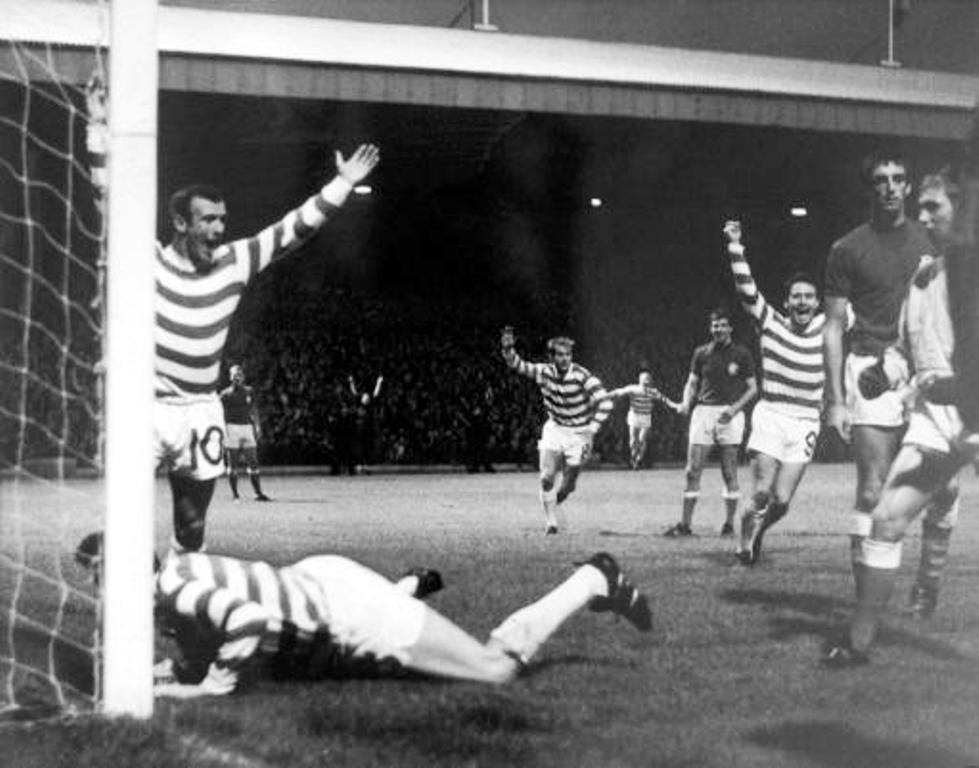
Season 1969/70 would be a rollercoaster of joy and despair for Celtic. The Hoops would edge another League Cup section including Rangers after both sides had won their home games, the Ibrox side’s dropped point against Willie’s old club, Raith Rovers, proving critical.
Wallace had then received his marching orders for the second time as a Celt, brawling with Dunfermline Athletic’s Willie Renton in a bad-tempered clash at East End Park on Saturday, 6 September 1969, the hosts winning that one 2-1.
Ronnie Simpson then, sadly, became the first of the Lions to cease the wearing of the green, after dislocating his shoulder at Hampden in the replayed League Cup semi-final against Ayr United, on Monday, 13 October 1969, just two days into ‘Faither’s’ 40th year. Willie Wallace would come off the bench to replace the stricken keeper, with Tommy Gemmell taking over in goals as the Hoops won 2-1.
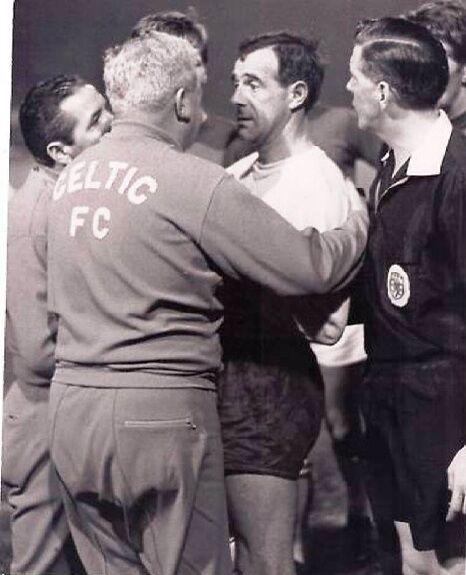
An early goal from Bertie Auld in the final 12 days later would then be enough to defeat a St Johnstone side playing in its first major cup final, Celts claiming an unprecedented fifth successive triumph in the competition, albeit at the cost of a broken ankle for another Lisbon hero, Stevie Chalmers. That would ultimately prove significant also.
December 1969 had been the most productive month so far that season for Willie in terms of goals, doubles against St Johnstone, Dundee United and Partick Thistle within a fortnight, as the Bhoys scored 22 goals in just four League games, taking his Hoops tally to the magical 100, an excellent and timely way to mark his third anniversary as a Celt.
The League had ultimately been won comfortably, a point at Tynecastle sealing five-in-a-row before March was out, as the gulf between the champions and the others continued to grow. The Celts had looked good for another Treble also, as they faced Aberdeen in the Scottish Cup final for the second time in four seasons, reviving happy memories for Willie, his two-goal haul winning the 1967 showpiece to the disappointment of his old pal, Aberdeen’s Jim Storrie.
Sadly, for both Willie and this 9-year-old author attending his first cup final, a combination of Robert Holley Davidson and Derek ‘Cup-tie’ McKay would see Martin Buchan rather than Billy McNeill hold the famous old trophy aloft on Saturday, 11 April 1970, in front of 108,000 fans.
But like the Murphy’s…
Four days later, a Celtic side excluding Willie Wallace beat Leeds United 2-1 at Hampden in front of 136, 505, the largest attendance ever to watch a club match in European competition, to reach a second Champions Cup final in just four seasons.
Whilst Jock Stein had preferred Yogi to Wispy at Hampden, Willie had played his part in Celtic getting there, scoring against both Fiorentina and Benfica at Parkhead, in two nights which are still revered by Hoops supporters of a certain vintage. The Bhoys would now face Dutch champions Feyenoord in the final, the Rotterdam outfit having earlier disposed of cup-holders AC Milan, thus denying the defending champions the opportunity to play the final on their own ground, the San Siro.
The signs were good for Celtic. Like the 1967 campaign, the journey had begun against the Swiss champions, in this case Basel rather than Zurich, they had beaten the Italian champions again and played in Lisbon, albeit requiring the fate of a Dutch guilder to be guessed correctly by Billy McNeill after a torrid night in the Estadio da Luz at the hands of Eusebio and co. And now they would face their destiny at the home ground of Inter Milan. What could go wrong?
Well, pretty much everything as it turned out, in the din of Milan on Wednesday, 6 May 1970.
The omens continued to favour Celts, as Tommy Gemmell repeated his Lisbon trick, a decoy run par excellence by the Italian referee Concetto Lo Bello fooling Eddy Pieters Graafland in the Feyenoord goal to give the Hoops the lead. Graafland and Wallace had faced each other at Hampden in an international friendly back in 1966. Sadly, Eddy passed away in April of this year, just a week short of the Golden Anniversary celebrations in Rotterdam. God bless him.
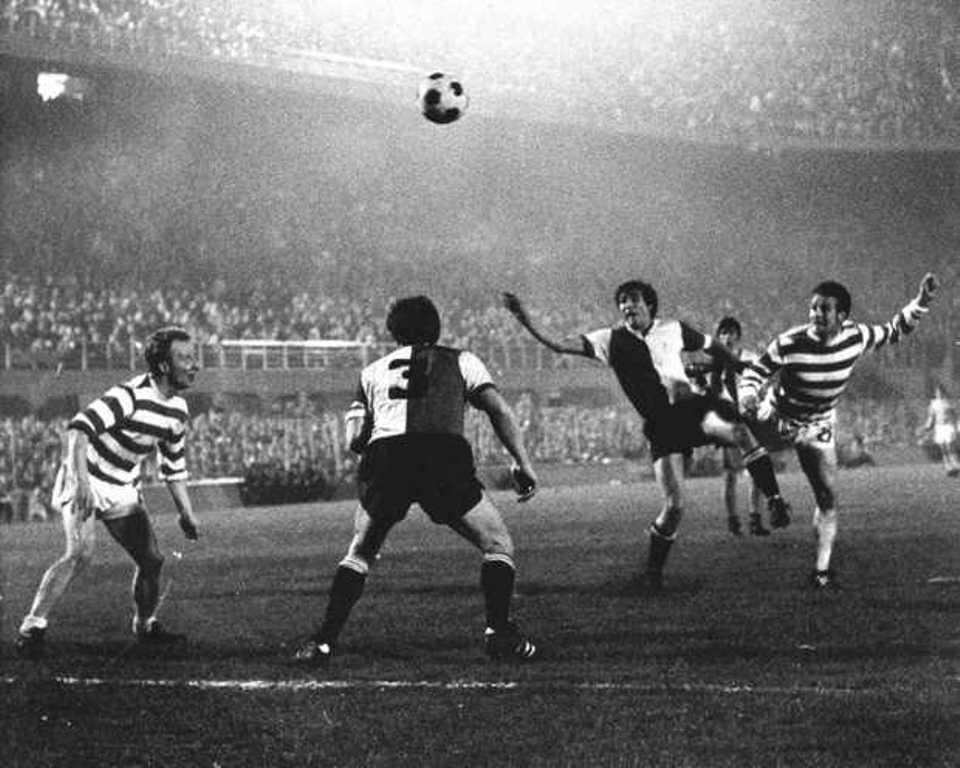
But as we sat back in front of the television to enjoy the evening, we had misread the script.
Unlike Lisbon, it was Celtic who were the overwhelming favourites, and who would later be accused of underestimating the opposition. Of having won it before we played the game.
With the favourites taking the lead only serving to confirm their so-called superiority, the underdogs immediately struck back, a looping header from Feyenoord skipper Rinus Israel, their Cesar, leaving Evan Williams helpless in the Celtic goal, and suddenly it was game on.
As the match progressed, the Dutch were winning battles on and off the field, the klaxons my abiding memory of that evening. How Celts survived as long as they did will forever remain a mystery to me but survive they did, an old champ bouncing back from the ropes, refusing to go down. Then, in the dying seconds of extra-time, a replay imminent and bringing the chance of redemption, of rewriting our history, there is a slow-motion goal, with defenders falling over and a goalkeeper seconds too late to stop the danger, and a Swedish hitman to curse rather than love, Ove Kindvall flicks the ball over Evan Williams to win the cup for Feyenoord.
In time, perhaps the fantastic achievements of that run will be properly recognised, to beat the clubs we did and beat them the way that we did, albeit that pain will never entirely fade.
But for now, there is only that pain.
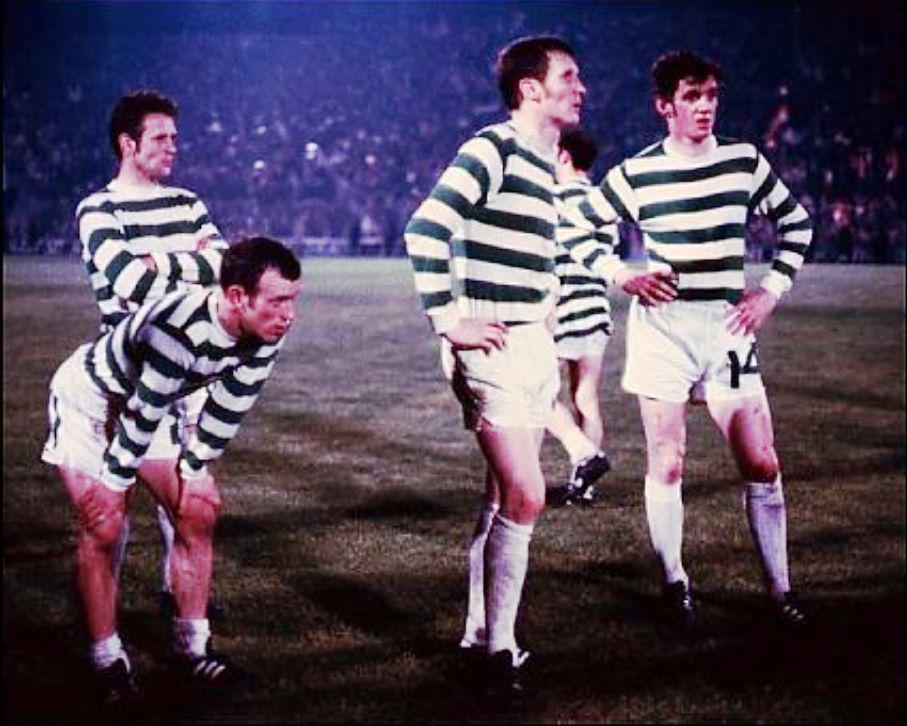
Willie reached a personal landmark during the close-season, turning 30 years-old on 23 June, and two weeks later, Olive presented him with a second daughter, Fiona, born on 9 July 1970.
The new dad would find himself in trouble with officialdom for a third time in his Hoops career after an altercation with Clyde winger Sam Hastings, just before half-time in a League Cup-tie played at Shawfield on Wednesday, 19 August 1970. Celts would progress to the semi-final where they would face an old friend, Charlie Gallagher, having been released from Parkhead in the summer, now turning it on with his new club, last-four opponents Dumbarton.
Willie would feature prominently in the first game, played at Hampden on Wednesday, 7 October 1970, albeit he would probably rather have not, Sons keeper Lawrie Williams making a double save from his extra-time penalty kick as the match ended goalless. The pair would later become friends and teammates, as Willie arrived at Boghead, whilst surplus to requirements Charlie Gallagher, rather ironically, was later named as man-of-the-match. Such is football.
Willie would have a more pleasant role in the replay, five days later, edging Celtic 3-2 ahead in extra-time after Charlie had begun Dumbarton’s fightback from two goals down by scoring from the spot after 65 minutes, Lou Macari’s late strike ultimately proving decisive as Celts marched through to a seventh successive League Cup final later that month. A header from a 16-year-old Derek Johnstone would give Rangers a first trophy in four years and end Celtic’s run of successes at five-in-a-row, a third consecutive cup final defeat for the Hoops after Aberdeen and Feyenoord. There would be a few more defeats in that particular final to follow.

Work to remove the Milan hangover began with landslide victories over Finnish champions KPV Kokkola and Ireland’s Waterford United in the European Cup, with Willie amongst the goals again, scoring twice in Finland then notching a hat-trick at Lansdowne Road in front of 50,000 spectators – his first struck within 20 seconds of the kick-off – before making way for Vic Davidson on the hour mark.
On Tuesday, 9 February 1971, Celts faced the now-world champions Feyenoord at Hampden in a friendly, the match ending 1-1. This was ahead of the upcoming European Cup quarter-final with current Dutch champions, Ajax.
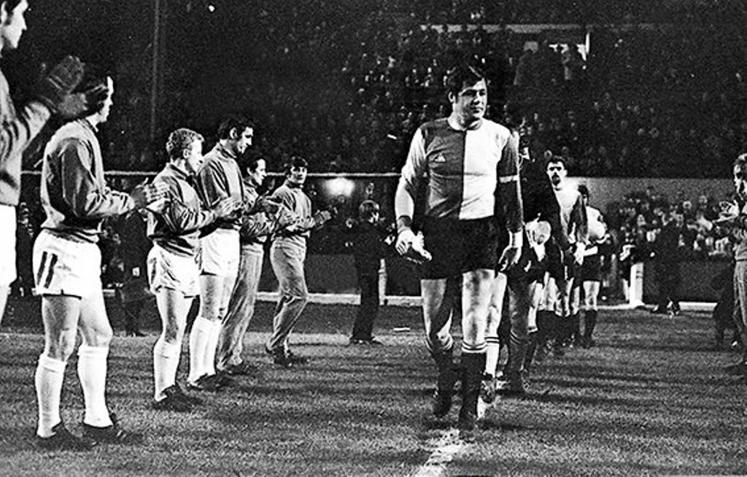
The first leg was played in Amsterdam on Wednesday, 10 March 1971, Wallace coming up against another of the Dutch international side from that friendly at Hampden five years earlier, Piet Keizer. The legendary winger would have the final word that evening, his last-gasp strike making the score 3-0 and surely taking the tie out of Celtic’s reach. Despite a valiant attempt at Hampden two weeks later, Jimmy Johnstone’s solitary counter would see the dream end for another season, Ajax succeeding fierce rivals Feyenoord as European champions, driven by the genius Cruyff.
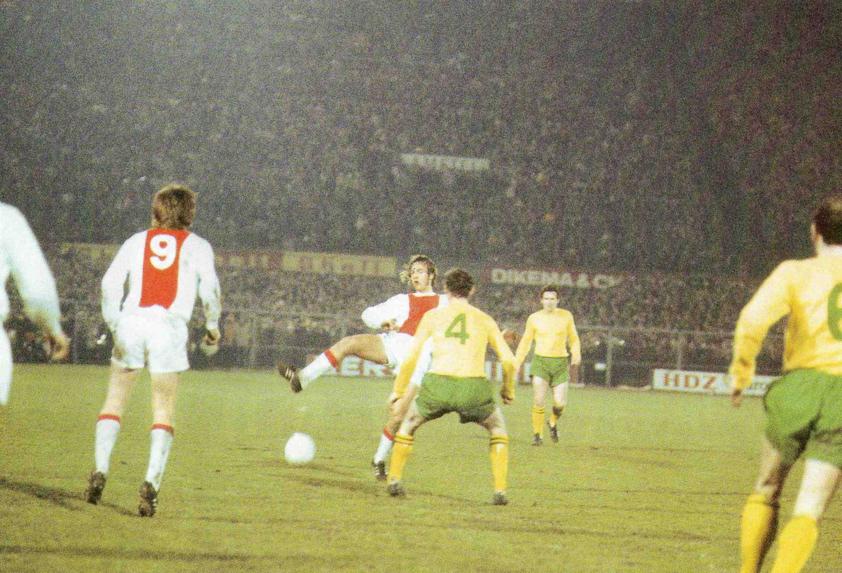
There would be another domestic double for Celtic to celebrate though, Willie scoring the second Celtic goal at Hampden on Thursday, 29 April 1971, which allowed Jock Stein to emulate Willie Maley by winning six consecutive Scottish League titles.

The home match had been moved there with construction work continuing on the main stand at Celtic Park. Two days later, the ground resembling a building site on one side, the Lisbon Lions took their final bow as a team, for the final League fixture of the season.

The retired Ronnie Simpson joined the other ten Lions down the enclosure steps before handing the gloves to his successor, Evan Williams, who would play against Clyde. On an emotional afternoon, 35,000 supporters gave the immortal Lions a fantastic ovation as they roared one last time, Willie scoring twice, Bobby Lennox grabbing a hat-trick and Stevie Chalmers hitting a sixth as they declared at 6-1.
Bertie Auld would be carried shoulder-high from the field on his last appearance, prior to leaving on a free transfer to join Hibernian. It would transpire to be the final call for John Clark and Stevie Chalmers also, they would both be in the blue-and-white Hoops of Morton in the new season. The times they were a-changing, as the fabulous Bob Dylan once sang.
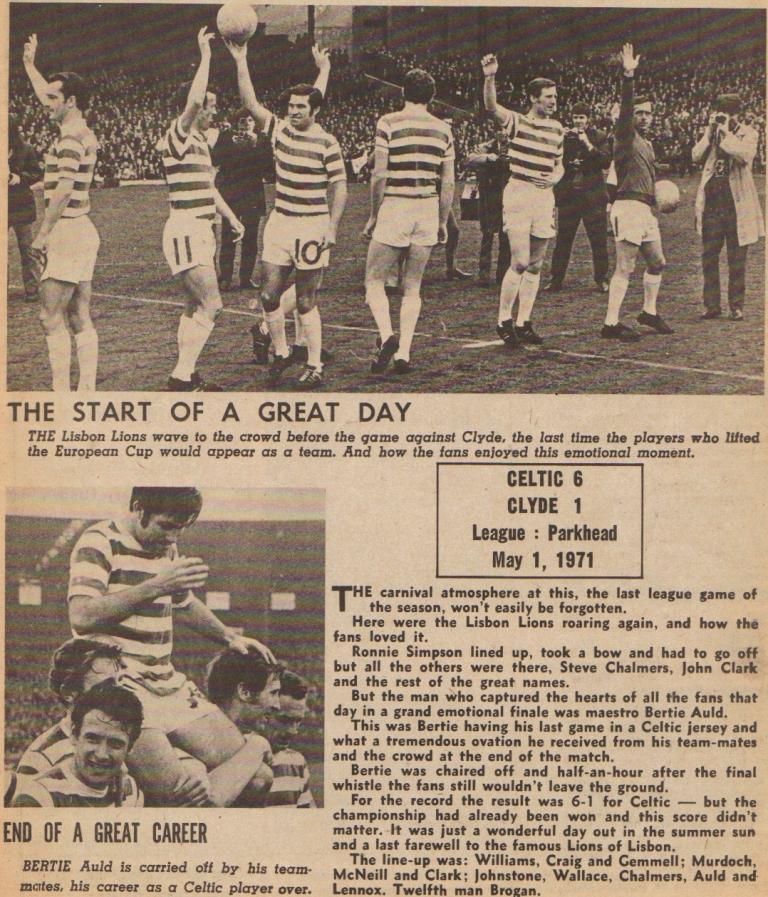
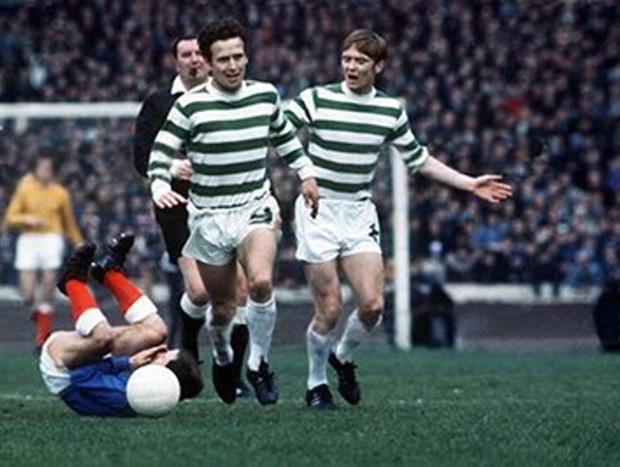
Perhaps signifying the transition in place at Celtic Park, only five of the Lisbon Lions started the Scottish Cup final against Rangers at Hampden on Saturday, 8 May 1971, Jim Craig and Billy McNeill in defence plus the attacking trio of Jimmy Johnstone, Willie Wallace and Bobby Lennox.
And it was the evergreen Lennox who put Celts ahead just before the interval, in front of 120,000 spectators. They would hold that lead until three minutes from time, when Derek Johnstone once again popped up to put the champagne in ice.
Four nights later, Willie found himself on the bench, young Lou Macari thrust on for his first senior cup appearance, in the only change from Jock Stein’s weekend line-up. Macari would seize his opportunity, opening the scoring with a cute flick from a corner-kick midway through the first half, Harry Hood then cementing Celtic’s name on the cup with a penalty, 60 seconds later, after Jimmy Johnstone, having one of his greatest games in the Hoops, teased Ronnie McKinnon into a rash challenge.
Wallace would replace Hood for the final 15 minutes, after a Jim Craig own goal had allowed the Ibrox men a glimmer of hope, however, the flags would be flying in triumph from the Kings Park end of Hampden at the end of that glorious sunny evening, a wonderful sight I will never forget, whilst watching the highlights later that evening on television in Springburn.
The Parkhead turnaround in personnel would take a further leap with the incredible scoring introduction of the 20-year-old Kenny Dalglish in the Hoops in July 1971. This would have particular implications for two key players in the Stein era, John Hughes and Willie Wallace, who would now find themselves in the final throes of their Parkhead careers. They would be on the periphery as Kenny scored in all three Ibrox victories achieved in a 28-day period, as would Steve Chalmers, who finalised a transfer to Morton after the third of those successes.
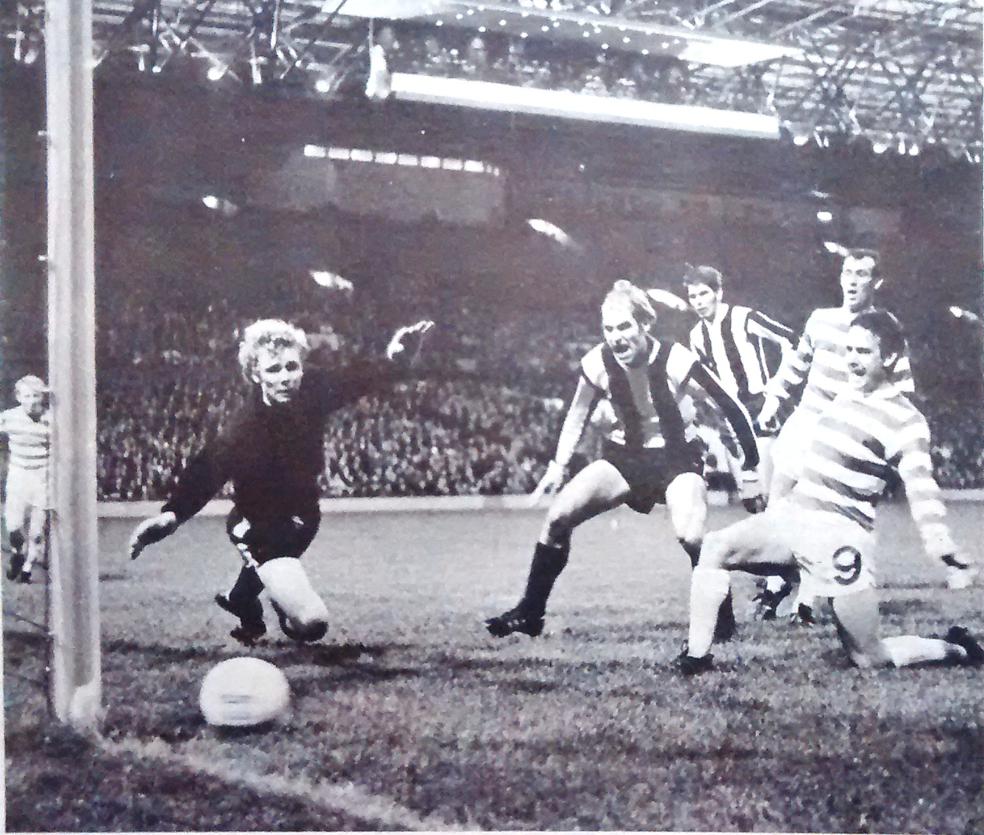
On Wednesday, 29 September 1971, Hughes and Wallace featured in a Hoops team together for the final time, Willie starting and scoring twice against BK1903 Copenhagen to turn a 2-1 first-leg deficit around, whilst Yogi replaced Bobby Lennox at half-time. That would be the last appearance for John Hughes and those the last goals scored by Willie Wallace at Celtic.
Willie would get a final run-out, appropriately at Hampden, as a late substitute for Tommy Callaghan, with Celtic leading St Mirren 3-0 on Wednesday, 6 October 1971 in the League Cup semi-final, setting up the ultimately disastrous meeting with Partick Thistle later that month. By that time, both Hughes and Wallace were Crystal Palace players, sold to the Surrey club on the eve of Celtic’s next European tie, with Maltese outfit Sliema Wanderers, on 19 October

In his autobiography, ‘Heart of a Lion’, Willie tells of how he was summoned to a breakfast meeting with Jock Stein at Seamill, then driven to Celtic Park with hardly a word exchanged, an incredible way for someone who had given so much to the cause to leave the club. After picking up Crystal Palace representatives at the airport, en route to the stadium, he would learn that John Hughes would also be leaving as part of the same transfer. Yogi had been in dispute with the club at that time, so perhaps that was less of a surprise. It would be Palace manager Bert Head who would make arrangements for Willie to call his wife, Olive, to let her know about the potentially life-changing discussion taking place around him. Quite bizarre.
In any case, 10 minutes after negotiations commenced, he had agreed to become Willie Wallace of Crystal Palace, ending five trophy-laden years at Celtic Park. Yogi would come also.
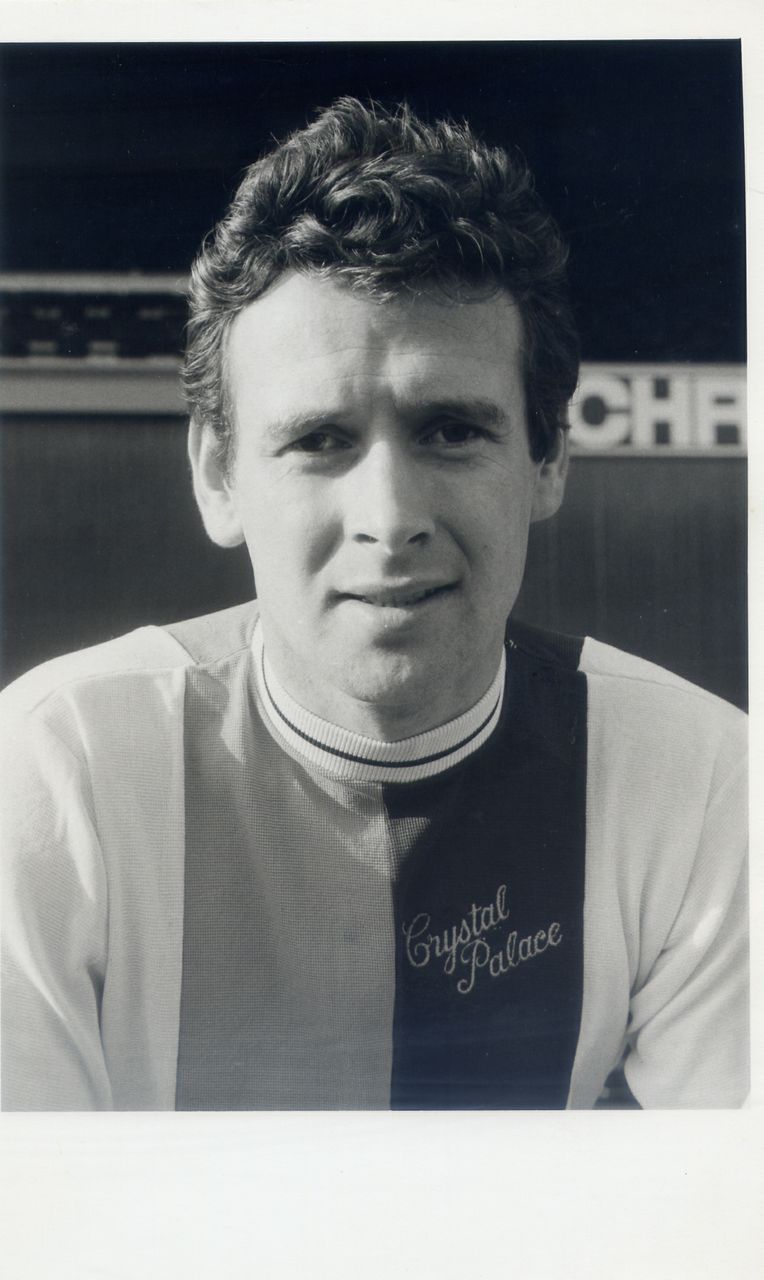
They would join a mini-Scots colony at Selhurst Park, known jokingly as ‘The White Heather Club’, with others such as Gerry Queen, John McCormick, Jim Scott, Tony Taylor and Sam Goodwin. Other familiar names at the club were long-serving keeper John Jackson, plus former Chelsea record-goalscorer, Bobby Tambling, who had netted for the English League in Willie’s last appearance at that level.
The bhoys would later come up against their old friend Tommy Gemmell, who had left Celtic in November 1971 and was now plying his trade with struggling Nottingham Forest, Willie’s header winning that particular match in January 1972 at the City Ground and Forest relegated at the season’s end. A few weeks earlier, Yogi had scored a ‘goal of the season’ contender, in a 5-1 win over Sheffield United at Selhurst Park.
Willie would play in Croydon for 12 months, scoring four goals in 39 League games at the club, before heading back home to join Dumbarton on 12 October 1972, following the replacement of Bert Head by Malcolm Allison in the Palace dugout.
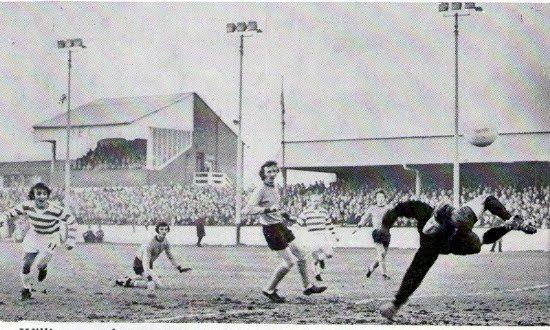
His first game for the Sons against his old Celtic teammates would prove to be a painful experience, Celts winning 6-1 at Boghead on Saturday, 2 December 1972, teenage wing-half Pat McCluskey the unlikely hat-trick hero. Willie did, at least, have the consolation of scoring the last goal of the game, for a Dumbarton side who included another ex-Celt, John Cushley, the McAdam brothers and former Rangers, Dundee United and Scotland winger, Davie Wilson, the man involved in the incident where Jock Stein had once fined Willie for not punching him hard enough! Only in Scottish football!
Wallace fared little better in the return League fixture, played at Celtic Park on Wednesday, 18 April 1973. Dixie Deans scored a hat-trick, as Celts homed in on eight-in-a-row with a 5-0 victory. Deans had been sent off whilst playing for Motherwell on the same ground on the day Willie had made his Celtic debut, back in December 1966, and had then been signed by Jock Stein immediately after Wallace had been sold to Crystal Palace, in a deal reminiscent of those which had seen Joe McBride snapped up from Fir Park then Willie himself bought from Hearts. In the eyes of many, Dixie Deans had been a direct replacement for Willie Wallace.
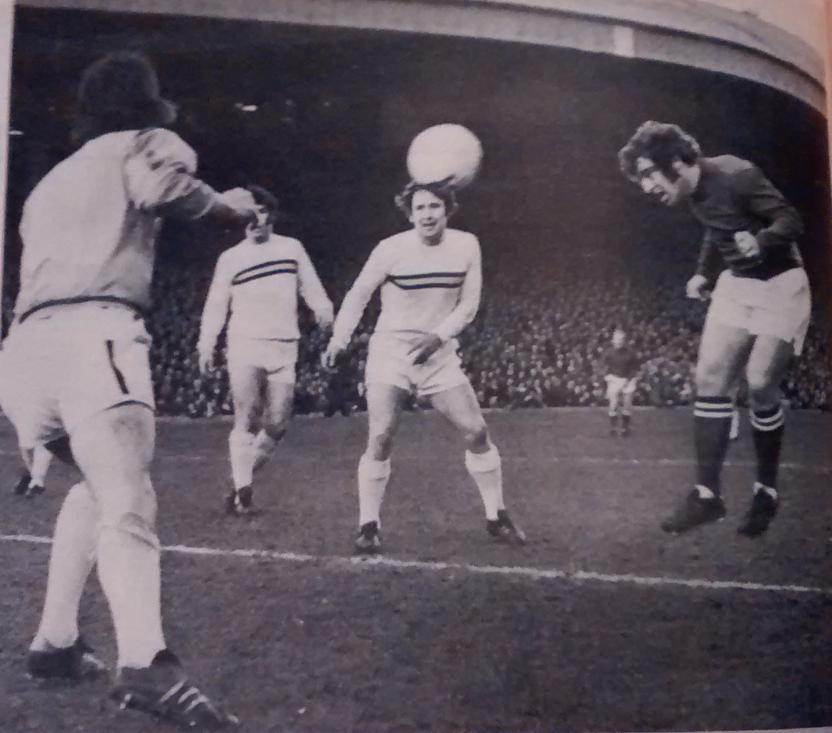
The next meeting of the two clubs would see Celtic score twice without reply at Boghead on Saturday, 24 November 1973, however, the Sons would share six goals at Parkhead when the teams clashed on Saturday, 30 March 1974, a late equaliser from Dixie Deans salvaging a point for the 9-in-a-row chasing Celts, after both McAdam brothers had scored in the first half.
The final season of the old League set-up in Scotland would see Celtic travel to Dumbarton on Saturday, 5 October 1974, the Hoops on the back of a disappointing European exit on the outskirts of Athens, to Olympiakos, Billy McNeill’s last match at that level. Willie’s old friend Jimmy Johnstone, enjoying his own final throes of a fabulous Parkhead career, opened the scoring within three minutes with his erstwhile successor, Deans, adding a second before half-time. Wallace would then score his final goal against Celtic, from the penalty spot with 20 minutes remaining, before the new King, Kenny Dalglish, sealed a 3-1 win for Celts late on.
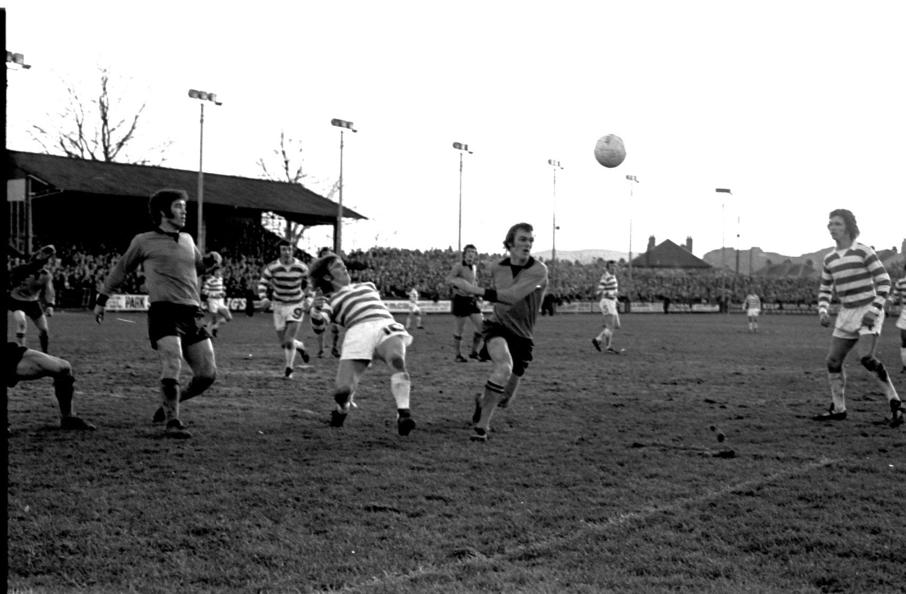
There would be two more clashes between the clubs before Willie left Boghead.
On Tuesday, 11 February 1975, Celts continued to throw away points in the quest for ‘The 10’ by losing a two-goal lead at home to a Dumbarton side featuring three former Celts, Donald Watt, John Cushley and Wallace, the equaliser coming from a future Bhoy, Tom McAdam.
And McAdam would be on target again in Willie’s final fling against his old club, set up by the Lisbon Lion to head an equaliser for the Sons of the Rock in the eighth minute of their Scottish Cup quarter-final tie at Boghead on Saturday, 8 March 1975. Ronnie Glavin had opened the scoring for the holders, three minutes earlier, and Paul Wilson would seal a place in the last four on the hour mark. Celts would go on to lift the trophy again in May, as Billy McNeill said goodbye after the most wonderful career in green-and-white. He would be closely followed by Jimmy Johnstone, freed in June 1975, leaving Bobby Lennox as the last Lion standing.
As Cesar was taking his leave from Parkhead, his old colleague Willie Wallace was bidding farewell to Scotland, the family making the life-changing decision to head for Australia, where Willie signed for Sydney-based outfit, APIA Leichhardt, a club formed by the Italian-Australian community. He would enjoy a successful spell there before returning to Scotland in March 1977, where a player-coach role at Highland League club Ross County would bring the curtain down on his on-field career.
Willie then hooked up again with fellow Lion Tommy Gemmell, as the big full-back became the new manager of Dundee in June of that year, Wallace a key part of his coaching team. They would be joined by a third member of that exclusive club, as Jimmy Johnstone had a last throw of the dice as a player, whilst a young Gordon Strachan learned his trade at Dens Park.

The Wallace family would later head back to the sunshine of Australia once again, as Willie took up a coaching role at his old APIA club, setting up in business and for life back in Sydney, where he has remained ever since, barring the regular trips back to Scotland to keep in touch.
There was a lovely moment when Celtic captain Scott Brown went up those famous Hampden steps in May 2017, to receive the Scottish Cup, after an Australian Bhoy, Tom Rogic, had made the dream of that Invincible Treble a reality in the dying seconds of the 2016/17 cup final.
There to greet him, almost 50 years to the day when the European Cup had been won against all the odds, were Lisbon Lions John Clark and Willie Wallace, the latter home to celebrate that Golden Anniversary with his lifelong friends at the Hydro on the previous Thursday, then to watch the latest batch of Celts make their own piece of football history.
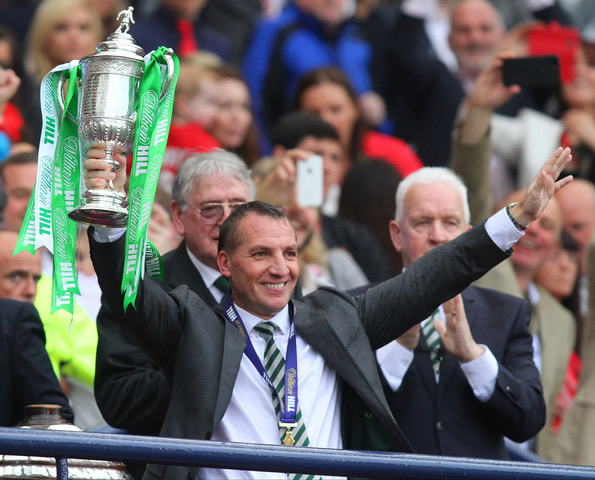
The INVINCIBLES meet the IMMORTALS.
I like that.
A Lisbon Lion…and so very much more.
Matt Corr
